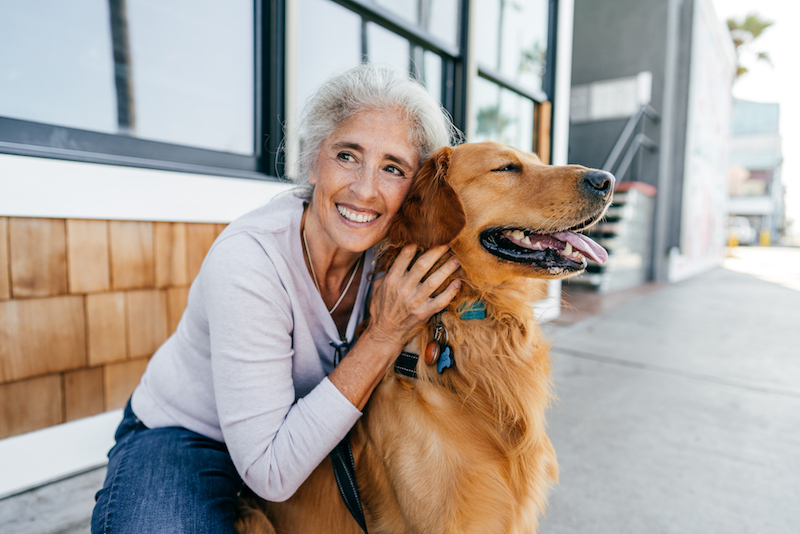Pets come in many sizes and shapes, but whether they walk, swim, slither or fly, they provide a healthy and fulfilling experience for the senior adults who care for them and love them.
Health Benefits for Seniors with Pets
Pets provide a cure for loneliness, isolation, and depression in seniors. They comfort and heal. For example, according to the Mayo Clinic, owning a dog may improve heart health, because ownership increases physical activity for the dog owners, motivating them to get up and move. Having a dog has also been shown to improve mood, provide a source for socialization with fellow dog-lovers, restore a sense of purpose and improve their nutrition.
Pets make us better and healthier people. Cats, birds, guinea pigs, rabbits, or other creatures that inspire or intrigue us also provide a number of health benefits, such as:
- Lower blood pressure
- Lower cholesterol
- Reduced stress and depression
- Better recuperation after a heart attack, surgery, and illnesses
- Fewer medications needed than by those who don’t own pets
In short, caring for a pet makes it more likely that a senior will care for him or herself.
How to Choose the Best Pet for You
As a senior, selecting the pet that is ideal for you requires some self-evaluation. Some things to consider:
Have you owned a pet before? If you are used to a set routine, be prepared to alter that routine. However, if you are willing to accept some change, the reward of owning a pet can more than offset the effort required to make the needed adjustments.
What age pet works best for you? A puppy or kitten will require some training, and you need to consider who would take care of your pet should you become disabled, hospitalized, or if the pet would survive you.
If you need to move into a senior living community, does the community allow seniors with pets to take their animals with them?
What will be the financial cost of ownership for the pet or pets you select?
Dogs
If you are thinking about a dog, your ability to handle the dog on a leash or even at play in the home is important to think about. A large dog can be a hazard. This is especially true if you have some strength, balance, and mobility challenges. And don’t assume that all small dogs are contented to be held in your lap.
Dogs recommended for seniors include:
Cavalier King Charles Spaniel. A quiet and gentle-natured dog that typically weighs around 15 pounds.
Shih Tzu. The Shih Tzu ranges in weight from 9 to 16 pounds, and is easy to handle, though it can be a bit stubborn.
Corgi. Weighing 24 to 30 pounds, these dogs are smart and easily trained. They are herding dogs, which means they need the exercise of daily walks.
There are some small dogs that seniors might want to avoid. Dogs that could present a challenge:
Jack Russell Terrier. The Jack Russell Terrier is small, but extremely high-energy, and would require a lot more effort than a calmer breed.
Border Collie. Likewise, Border Collies are also high-energy and require a lot of grooming.
Chow Chow. The Chow Chow is another small dog but with a temperament that requires a lot of patience and understanding from its owner.
There are, undoubtedly, seniors with pets who own and have wonderful relationships with these breeds, but the behavioral tendencies and temperaments of dog breeds should be considered before bringing one into the home.
Cats
Cats generally require less care and attention than dogs. This allows the owner to enjoy the companionship of a cat and settle into a less challenging routine. They are also a good choice for a senior who is not able to walk a dog.
Newsweek lists the 25 best cat breeds for seniors.
The cats on the list were selected based on suitable traits, such as friendliness, calmness, affection, and being people-oriented. Some of the breeds listed include the following:
American Curl. This cat is described as being physically affectionate, and loving human contact.
American Wirehair. This is an adaptable breed that would be happy living as a lap cat.
Chartreux. A beautiful cat, described as calm yet playful.
Birds
Canaries, parakeets, cockatiels, and lovebirds add beautiful sight and sound to a home.
When it comes to birds as pets, their longevity is something to consider by a senior who may need to make plans for the bird’s care if their pet outlives them. For example, cockatiels live 15 to 20 years, and some up to 35 years. Lovebirds live as long as 20 years, and parakeets can live to be 18.
Do your research, as many other birds have long lifespans.
Fish
Watching colorful fish swim around can be relaxing and entertaining. Goldfish are hearty and do not require a large elaborate aquarium.
Where to Get a Pet
Dogs, cats, and other pets can be found at a variety of places, such as:
- Animal shelters
- The local humane society
- Petfinder.com
- Pet stores or breeders
Mixed-breed dogs from a shelter or your local humane society are often the best pets for a senior. They are trained and have fewer health problems than purebred dogs. Also, volunteers at the shelter can tell you a lot about the animal that has been in their care.
To find more tips for staying independent as you age, visit Bethesda’s blog.
| Bethesda has a 133-year tradition of providing excellent senior living options, including independent living, assisted living, memory care, and skilled nursing. If you are considering independent living, we welcome you to tour one of our exceptional communities, including Bethesda Barclay House – Clayton, Bethesda Gardens – Kirkwood, Bethesda Orchard – Webster Groves, Bethesda Terrace – South County, Village North Retirement Community – Florissant, and The Oaks at Bethesda Villas – Kirkwood/Webster. Discover the level of care only a non-profit staffed by highly-trained nurses, therapists, and aids can offer. |
Want to find out more?
If you’d like to stay up to date with Bethesda Health Group, sign up here to receive our blog and newsletters!
"*" indicates required fields
Related Articles
Want to find out more?
If you’d like to stay up to date with Bethesda Health Group, sign up here to receive our blog and newsletters!
"*" indicates required fields



